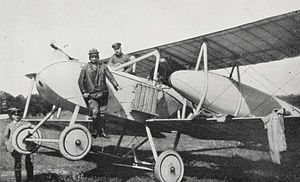AGO C.I
Appearance
| C.I | |
|---|---|

| |
| Role | Reconnaissance |
| Manufacturer | AGO Flugzeugwerke |
| Designer | August Häfeli |
| Introduction | June 1915 |
| Primary user | Germany |

The AGO C.I was a First World War German pusher reconnaissance biplane that used a pod-and-boom configuration.
Development
The crew and pusher engine shared a central nacelle, and the twin booms carried the tail and the four-wheeled landing gear. The observer sat at the nose and was armed with a machine-gun.[1] It was produced in both two bay and three bay versions. A single example was fitted with floats for coastal patrol duties for the Imperial German Navy (designation C.I-W).
Operators
Specifications
General characteristics
- Crew: two, pilot and observer
Performance
References
- ^ van Wyngarden, G (2006). Early German Aces of World War I, Osprey Publishing Ltd. ISBN 1-84176-997-5
- Taylor, Michael J. H. (1989). Jane's Encyclopedia of Aviation. London: Studio Editions. p. 39.
- Das Virtuelle Luftfahrtmuseum
See also
Wikimedia Commons has media related to AGO C.I.
Aircraft of comparable role, configuration, and era Airco DH.6 - Royal Aircraft Factory F.E.2
